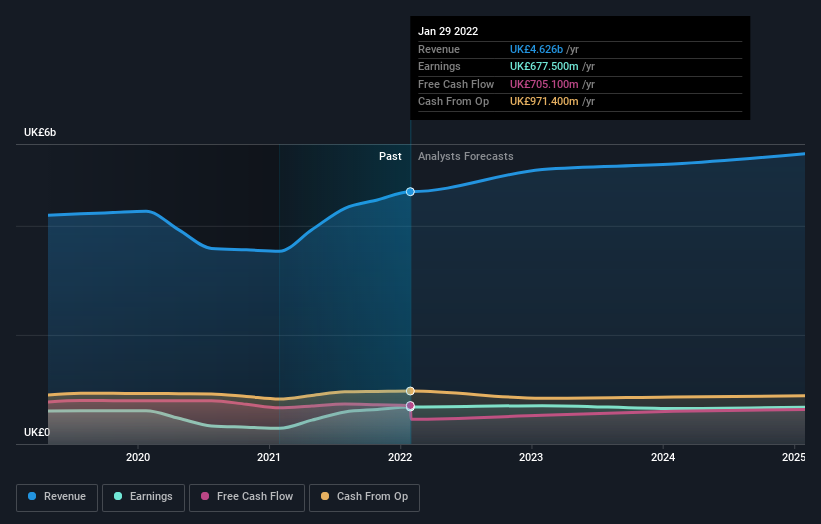When Should You Buy NEXT plc (LON:NXT)?

While NEXT plc (LON:NXT) might not be the most widely known stock at the moment, it received a lot of attention from a substantial price movement on the LSE over the last few months, increasing to UK£68.06 at one point, and dropping to the lows of UK£57.32. Some share price movements can give investors a better opportunity to enter into the stock, and potentially buy at a lower price. A question to answer is whether NEXT's current trading price of UK£58.82 reflective of the actual value of the mid-cap? Or is it currently undervalued, providing us with the opportunity to buy? Let’s take a look at NEXT’s outlook and value based on the most recent financial data to see if there are any catalysts for a price change.
View our latest analysis for NEXT
What's The Opportunity In NEXT?
The share price seems sensible at the moment according to my price multiple model, where I compare the company's price-to-earnings ratio to the industry average. In this instance, I’ve used the price-to-earnings (PE) ratio given that there is not enough information to reliably forecast the stock’s cash flows. I find that NEXT’s ratio of 10.76x is trading in-line with its industry peers’ ratio, which means if you buy NEXT today, you’d be paying a relatively reasonable price for it. Although, there may be an opportunity to buy in the future. This is because NEXT’s beta (a measure of share price volatility) is high, meaning its price movements will be exaggerated relative to the rest of the market. If the market is bearish, the company’s shares will likely fall by more than the rest of the market, providing a prime buying opportunity.
Can we expect growth from NEXT?

Future outlook is an important aspect when you’re looking at buying a stock, especially if you are an investor looking for growth in your portfolio. Although value investors would argue that it’s the intrinsic value relative to the price that matter the most, a more compelling investment thesis would be high growth potential at a cheap price. Though in the case of NEXT, it is expected to deliver a negative earnings growth of -0.6%, which doesn’t help build up its investment thesis. It appears that risk of future uncertainty is high, at least in the near term.
What This Means For You
Are you a shareholder? NXT seems priced close to industry peers right now, but given the uncertainty from negative returns in the future, this could be the right time to reduce the risk in your portfolio. Is your current exposure to the stock optimal for your total portfolio? And is the opportunity cost of holding a negative-outlook stock too high? Before you make a decision on NXT, take a look at whether its fundamentals have changed.
Are you a potential investor? If you’ve been keeping an eye on NXT for a while, now may not be the most advantageous time to buy, given it is trading around industry price multiples. This means there’s less benefit from mispricing. In addition to this, the negative growth outlook increases the risk of holding the stock. However, there are also other important factors we haven’t considered today, which can help gel your views on NXT should the price fluctuate below the industry PE ratio.
With this in mind, we wouldn't consider investing in a stock unless we had a thorough understanding of the risks. To help with this, we've discovered 3 warning signs (1 is a bit unpleasant!) that you ought to be aware of before buying any shares in NEXT.
If you are no longer interested in NEXT, you can use our free platform to see our list of over 50 other stocks with a high growth potential.
Valuation is complex, but we're here to simplify it.
Discover if NEXT might be undervalued or overvalued with our detailed analysis, featuring fair value estimates, potential risks, dividends, insider trades, and its financial condition.
Access Free AnalysisHave feedback on this article? Concerned about the content? Get in touch with us directly. Alternatively, email editorial-team (at) simplywallst.com.
This article by Simply Wall St is general in nature. We provide commentary based on historical data and analyst forecasts only using an unbiased methodology and our articles are not intended to be financial advice. It does not constitute a recommendation to buy or sell any stock, and does not take account of your objectives, or your financial situation. We aim to bring you long-term focused analysis driven by fundamental data. Note that our analysis may not factor in the latest price-sensitive company announcements or qualitative material. Simply Wall St has no position in any stocks mentioned.
About LSE:NXT
NEXT
Engages in the retail of clothing, beauty, footwear, and home products in the United Kingdom, rest of Europe, the Middle East, Asia, and internationally.
Outstanding track record with excellent balance sheet.


